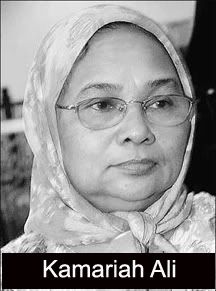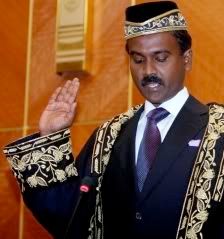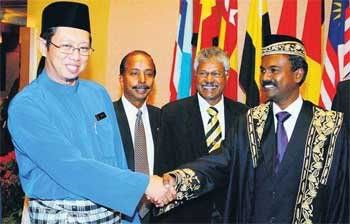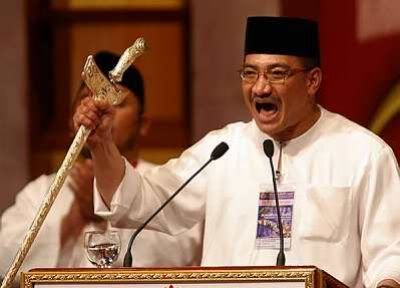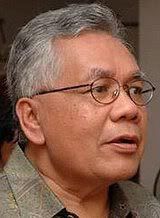From
ALIRAN: Read
here article by Khoo Boo Teik HIGHLY RECOMMENDED READING BY ALL MALAYSIANS
Looks back at how the people came together to collectively crack the BN’s supposedly shatter-proof hegemony. Analysing the transformed political landscape, the article discusses some of the fresh challenges that lie ahead.
Quote:
" In the 12th General Election of 8 March 2008, 49 per cent of the voters morphed into one gigantic electoral Monkey and cracked the Barisan Nasional’s supposedly shatter-proof hegemony.
Long-suffering voters spurned the ruling politicians and stunned their hacks and flunkeys.
It was Umno’s power, and, of course, it was arrogant. This (election) many, many more decided that ‘A vote against MCA and Gerakan and MIC is a vote against Umno’.
In short, the non-Malay voters snapped the BN chain at its weaker links. They showed their contempt for the timidity of MCA, Gerakan and MIC.
Umno will strive to impose its old ethnic politics upon the PKR-DAP-Pas experiments in new multi-ethnic politics..... the knee-jerk attacks on DAP for allegedly marginalising the Malays in Penang, on the Perak government for not having enough Malays in its Exco... unscrupulous tactics of ethnic assaults from quarters that claim to be the champions of national unity.
Hence, a host of newly formed ‘Malay action fronts’, sore and vengeful losers, will waste little time organising demonstrations, orchestrating media disinformation and fomenting ‘Malay anxieties’.
This manner of interpreting policies and practices in chauvinistic terms can only be defeated by a UNITED opposition that can come to the rescue of all five opposition state governments.
Above all, PKR and DAP, whose grassroots structures are underdeveloped, must find ways to root themselves in society, as PAS managed to in Kelantan during its years of isolation.
In principle, the broad answer has to be a non-sectarian social democracy. That can creatively fuse:
Anwar’s concept of a caring civil society,
the Parti Rakyat Malaysia’s plebian concerns,
the DAP’s old socialist claims, and
Pas’s Islamic welfarism.
Guided by such social democracy – rather than, say, a neoliberal meritocracy – PKR, DAP and Pas can formulate and implement policies that would most benefit the non-rich.
If the past is a good indication, however, Umno could be heading towards implosion for a third time. If that happens, it’d be the sort of political disorder that arises just as one system’s dying while another is struggling to be born.
Whatever happens, those who helped to create this situation were the wise and brave voters. No more risk averse, they decided that change was better than stasis.
Like it or not, love us or hate us, we’re all monkeys now."
-Khoo Boo Teik
The Monkey Strikes Back
by
Khoo Boo Teik
If you’ve read or
heard the tales from the Chinese classic,
Xi You Ji (Journey to the West), you’d recall that the amazing cudgel-wielding 72-morph
Sun Wukong, a.k.a. ‘Monkey’, first became famous for ‘creating havoc in Heaven’.
Long loved as an icon of recalcitrance,
Monkey swung as he pleased, shaking the established order and shaming the hirelings sent to suppress him.
In the 12th General Election of 8 March 2008, 49 per cent of the voters morphed, as it were, into one gigantic electoral Monkey and cracked the Barisan Nasional’s supposedly shatter-proof hegemony.
No more two thirdsLong-suffering voters spurned the ruling politicians and stunned their hacks and flunkeys by
handing 82 seats to the alliance of Parti Keadilan Rakyat, Democratic Action Party and Parti Islam SeMalaysia, thus breaking the BN’s two-thirds stranglehold on Parliament.
Collectively, Pas, PKR and DAP
took control of five states – Kedah, Kelantan, Penang, Perak, and Selangor – besides winning ten out of eleven parliamentary seats in the Federal Territory of Kuala Lumpur.
Overnight, PKR stopped being the one-seat party that the United Malays National Organisation had threatened to send into oblivion. Instead, PKR added 30 more to the sole parliamentary seat held by Datin Seri Dr Wan Azizah Wan Ismail in 2004.
Nor was PAS beleaguered any longer with a precarious one-seat majority in Kelantan. It won 38 out of 45 state seats in Kelantan and now governed Kedah, too.
For the first time ever, DAP took power in Penang by completely defeating both Gerakan Raykat Malaysia and the Malaysian Chinese Association.
In Perak and Selangor, the three parties formed coalition governments, however untidy their power-sharing process was (and however much they still need to formalise it to avoid being the playthings of non-electoral forces).
Caution v. confidence
The opposition’s unprecedented advance brought on a euphoric daze after virtually all the expert pre-election assessments were proven wrong, no less with the big picture than with the local scenes.
Take the magnificent Malaysia-kini. Its offer of ten-day free access caused countless surfers to jam its site on the evening of 8 March. Yet, even the redoubtable Steven Gan had cautioned that 40 seats would be a realistic advance for the combined opposition, a figure, Gan later said, that was ‘not even close’.
Or take Anwar Ibrahim, seemingly the most foolhardy of the opposition leaders for urging BN’s replacement while others only targeted its two-thirds majority. Anwar thought that PKR would do well to win 25 seats. In fact, PKR became the largest opposition party with 31 seats.
In Penang, an ill-concealed intra-party dispute over who should succeed Koh Tsu Koon as Chief Minister showed that Gerakan expected to retain power. But the four named and un-named pretenders to that position needn’t have troubled themselves. The DAP deleted Gerakan from Penang’s political terrain (
and Tsu Koon became the third of all three chief ministers, after Tan Sri Wong Pow Nee in 1969 and Tun Dr Lim Chong Eu in 1990, to depart office in defeat).
Whose fear?
Beyond seats and states, there was a popular disdain for scare-mongering.
The mainstream media issued its usual anti-opposition warnings of instability, erosion of investor confidence, Islamic state, and ‘May 13’. Some editors must have so believed their own propaganda that they were paralysed by the Chinese swing, the Hindraf factor, and the late Malay swing. Why else, for instance, did The Star Online, late on 8 March, show no result except BN’s ’10 out of 10’ parliamentary victories?
Outgoing Selangor Mentri Besar Khir Toyo threatened ‘zero opposition’ only to be ejected from power. Melaka’s Mohd Ali Rustam intimidatingly boasted that Umno could rule on its own – forever. Now he and his ilk must rue Umno’s insecure dependence on the goodwill of the unlikely power-brokers of Sabah and Sarawak.
The arrogance of power
When the Malay voters revolted in 1999, in response to Anwar Ibrahim’s persecution, many non-Malay voters rejected the Barisan Alternatif’s call for Reformasi. Instead, they helped to save Tun Dr Mahathir Mohamad and Umno and continued to support Abdullah Badawi in 2004. Abdullah also recovered the support of Malay voters who badly wanted a closure of the Anwar affair.
But four ‘work with me’ years under Abdullah did not reward Malay and non-Malay voters with promised reforms, but with an ‘arrogance of power’, as Tsu Koon, after some soul-searching, has belatedly admitted.
Of course, it was Umno’s power, and, of course, it was arrogant.
In ethnic terms, Umno soon reasserted its power. Ketuanan Melayu was not to be questioned; the New Economic Policy’s restructuring would be extended; the so-called Malay Agenda was timeless.
Hishamuddin Hussein, with
his keris-kissing antics, warned even Umno’s non-Malay partners, ‘Do not challenge us!’ Khairy Jamaluddin flashed his ‘My bangsa, right or wrong’ rhetoric and Umno Youth organised a protest of convenience against a pliant Gerakan in Penang.
In class terms, the power was flaunted by displays of the increasingly unaccountable corruption of the Umno-related oligarchs and the greed of new corporate groups with strong political cables. On the other hand, mass protesters against fuel price increases and rising inflation were met by tear gas, water cannons and Red Helmets.
In cultural terms, the regime’s claim to moderation, via Islam Hadhari, rang hollow. It seemed indifferent to religious disputes that blurred the jurisdictional boundaries between the civil and the Syariah courts, to the invasive body-snatching actions of religious bureaucrats, and to the insensitivity of Umno-dominated local governments towards incidents of temple demolition.
Reformasi's retribution
Within that context, the election result was retribution with a flavour of Reformasi, albeit appearing late and not quite following the Barisan Alternatif’s 1999 script.
Once, many non-Malay voters could be persuaded that ‘
A vote for DAP is a vote for PAS’.
THIS time, many, many more decided that
‘A vote against MCA and Gerakan and MIC is a vote against Umno’.
In short, the
non-Malay voters snapped the BN chain at its weaker links.
They showed their contempt for the timidity of MCA, Gerakan and MIC, gagged and impotent Chinese-based and Indian-based component parties.
It was unlikely that Malay voters significantly swung to parties such as DAP or even PKR. But in certain ethnically mixed constituencies, a late Malay swing or an appreciable Malay absenteeism at the polls compounded BN’s losses.
In Malay-majority constituencies, the old Umno-Pas division was still evident, leaving the
non-Malay swing to exert its impact.
The PKR’s present position is an ironic, almost un-Malaysian, outcome of the ethnic voting patterns. A party some had written off emerged as a symbol of multi-ethnic politics. Whatever its future, PKR’s leadership of a balanced Malay-non-Malay opposition has dragged Parliament from its old self of being dominated by BN and opposed by an entirely Malay Pas and an entirely non-Malay DAP.
New landscapeMany observers have likened this transformation of the political landscape to a tsunami, a perfect storm, or a surge of Makkal Sakthi (People Power) that outdid the Bersih and Hindraf rallies of late 2007.
The metaphors may be excessive. A true tsunami, say, would have swept BN out of office. A perfect storm would not have bypassed Sabah and Sarawak.
Yet, obviously, the transformation raises some urgent questions for an opposition that has begun to contemplate national power.
Breaking the two-thirds barrier was both a symbolic and real achievement. For some time now, the ability to amend the Constitution was not the crux of the two-thirds issue. Power was, and especially Umno’s unassailable power within BN.
Without the buffer of a two-thirds majority, however, BN’s ethnic power-sharing formula may be in jeopardy. If Umno insists on taking so many seats, to be able to rule on its own, it won’t be able to satisfy the demands of its 13 non-Malay adjuncts.
Actually, MCA and Gerakan had paid for Umno’s arrogance of power before, in 1986 and 1990. As they lick their wounds, MCA, Gerakan and MIC might stumble upon a simple truth: Stop playing ‘Kapitan China’ and ‘Kapitan Keling’
(no insult intended) to Umno’s ‘Tuan Melayu’, or be irrelevant – as Gerakan, shorn of its Penang base, seems already to be so.
Watch out for old politics
Partly for that reason,
Umno will strive to impose its old ethnic politics upon the PKR-DAP-Pas experiments in new multi-ethnic politics. We have already seen the knee-jerk attacks on DAP for allegedly marginalising the Malays in Penang, on the Perak government for not having enough Malays in its Exco, and so on.
We’ve seen before these unscrupulous tactics of ethnic assaults from quarters that claim to be the champions of national unity.
When Parti Bersatu Sabah, the original, not the current ersatz one, ruled Sabah, Umno sanctimoniously questioned if the Muslims there could be properly accommodated under ‘Christian rule’. When Pas ruled Kelantan and Terengganu, MCA, Gerakan and MIC would ask if the non-Muslims would be denied their rights.
Hence, a host of newly formed ‘
Malay action fronts’, sore and vengeful losers, will waste little time organising demonstrations, orchestrating media disinforma-tion and fomenting
‘Malay anxieties’. This manner of interpreting policies and
practices in chauvinistic terms can only be defeated by a united opposition that can come to the rescue of all five opposition state governments.
The worst scenario, if the alliance fails, is for Pas to join Umno in condemning the DAP-led government in Penang, and for DAP to join MCA, Gerakan and MIC in criticising the PAS-led governments of Kedah and Kelantan. In Perak and Selangor, the coalition governments can only escape such externally created problems by commitment to cooperation and collective responsibility.
Parliament and responsibility
Some encouragement may be derived from the sentiments of the opposition’s supporters. It’s one thing to vote ethnic in an ethnicised political system. It’s another thing altogether to regard all things in the stark light of inter-ethnic competition.
At least in the alternative cyberspace, voters, bloggers and commentators have admirably urged PKR, DAP and PAS to keep their differences to themselves, but, above all, to keep their alliance intact. Not to do so, the voters know, just as the leaders of these parties must know, would hand back to BN what was painfully gained at the election.
The presence of the largest ever opposition in Parliament has amplified popular hopes of reforming the political system. To this end, the opposition representatives must set out to raise the quality of law-making, monitor the Executive and discipline state institutions. To do so, they must themselves be
competent in diverse areas, capable of informed debate and committed to representing their constituents’ (
and not merely their parties’) interests.
The opposition representatives, no less than the backbenchers, should realise that the public sickens at name-calling, trading of insults and histrionics that
debase parliamentary proceeding. They should learn, from Lim Kit Siang at his best, and the
outstanding opposition figures of the 1960s, that dedicated parliamentary work requires a mix of investigative research, thoughtful arguments and courageous demands.
Economic management
The new opposition state governments should appreciate that they’ve taken power at a difficult juncture. They don’t know yet how the deepening troubles of the United States economy will affect each state’s economy. They should know that their scope for economic management will be limited by national policies and global market forces.
Even so, the opposition alliance must plan for employment creation, reasonable rates of growth, the alleviation of economic difficulties, and so on. Never mind, for example, that short-term, limited-impact measures are dismissed as ‘petty populism’ by the New Straits Times editors. That’s only the response of hacks who have fawningly publicised all of BN’s petty handouts.
For the medium-term, however, honest administration, competent planning and effective implementation must be the order of the day for PKR, DAP and Pas, just as it was for the original Gerakan when it captured Penang in 1969.
Renegotiating federalismIt’s well known that PBS in Sabah, and Pas in Kelantan and Terengganu had previously had to weather Umno’s wrath and the Federal government’s might.
Today, however, only the insane would risk impoverishing the national economy by strangling five opposition states and Kuala Lumpur which include the rice bowl, the manufacturing centres, and the seat of administration of the nation. Even they would not thereby alienate the influential chambers of commerce and industry and sensitive foreign investors.
The most hostile might conspire to inflict on the five states the
wang ehsan punishment that Pas-ruled Terengganu endured. But it’s politically infeasible to re-enact what has been discredited and what people despise, especially in urban centres that aren’t so dependent on direct federal expenditures.
Foes though they are, the Federal government and the state governments are compelled to talk to each other. High on the agenda of such talks should be a review of federalism itself, not by any means an unwelcome prospect.
Planning and action
On their part, the new and inexperienced state governments must realise this much. While resources are necessary, resourcefulness is indispensable. It’s reasonable to ask for learning time; it’s imperative to learn fast. It was fair politics to promise alternatives but it’d be suicidal politics not to act quickly, symbolically and meaningfully.
There is enthusiastic talk about engagement with civil society, participatory democracy and the restoration of local government elections. All this may help to distinguish the old administrations from the new, and, where necessary, expose past malpractices in order to cleanse the administrative machinery.
Above all, PKR and DAP, whose grassroots structures are underdeveloped, must find ways to root themselves in society, as PAS managed to in Kelantan during its years of isolation.
The new governments should consult a spectrum of social and economic interests. Yet, they should not yield to vested interests that reinvent themselves as the spokespeople of ‘civil society’ now that their links to BN have been severed. For that matter, there are NGOs and NGOs, and the new governments should not pander to the ‘upper middle class’ character of many visible NGOs.
Unifying ethos
The true measure of good government will be its attitudes towards the ‘little folks’ of our society, including the lower working classes, the poor and the disadvantaged, small retailers, hawkers, petty traders, the smallest of the SMEs, and so on.
In Penang, for example, there’s no reason to keep beautifying the charming Western Road-Macalister Road-Residential Road areas. It’d be better economics and urban management to clean up the inner city, rehabilitate decrepit former rent-controlled houses, and attend to the special needs of deprived neighbourhoods, whether these are Malay, Chinese, Indian or ‘Other’.
No one expects PKR, DAP and Pas to resolve overnight the differences in their visions of a better society. From where, then, might come common ideological planks that they can use to build a workable raft of shared policies?
In principle, the broad answer has to be a non-sectarian social democracy. That can creatively fuse Anwar’s concept of a caring civil society, the Parti Rakyat Malaysia’s plebian concerns, the DAP’s old socialist claims, and Pas’s Islamic welfarism.
Guided by such social democracy – rather than, say, a neoliberal meritocracy – PKR, DAP and Pas can formulate and implement policies that would most benefit the non-rich. After all these have been the staunchest opposition supporters and these would be constantly targeted by BN’s petty blandishments.
Turmoil in Umno
There is nothing destabilising about any of these. Potentially destabilising, though, is the turmoil that defeat has visited upon Umno.
The Umno leadership’s new spin is that BN hasn’t lost the election despite Abdullah’s initial response, ‘We’ve lost, we’ve lost.’ To Abdullah and his allies, BN holds a ‘strong majority only eight seats short of a two-thirds majority’. That is in fact so.
Nonetheless, the loss of the two-thirds majority; the fall in BN’s popular vote to 51 per cent; the failure to capture Kelantan; the defeat in four more states and Kuala Lumpur; the departure of several ministers; and the painful dependence on Sabah and Sarawak have intensified Umno’s chronic factionalism.
Much of that factionalism is tied to the loss of resources, projects and patronage, a grievous loss since Umno’s unreformed structures habitually mixed business with politics.
Another implosionFor now Umno’s turmoil can move in uncoordinated ways.
Political forces once pushed aside have re-surfaced to
challenge Abdullah whose position is weaker than in 2006, the year of his big spat with Mahathir.
Mahathir has called for Abdullah’s resignation. As if trying to be his father’s son, Mukhriz Mahathir has sent a letter to Abdullah in a farcical replay of Mahathir’s 1969 letter to Tunku Abdul Rahman.
Tengku Razaleigh Hamzah, who had twice failed to secure the leadership of Umno, has offered to challenge Abdullah for the party presidency.
The Malay Rulers have intervened in the appointment of Menteris Besar in Perlis and Terengganu. It will certainly be regarded as a defeat for Abdullah that both his nominees for Perlis and Terengganu were rejected and replaced by others more acceptable to the respective rulers.
The formation of the new Cabinet was fraught with disgruntlement. The ambitious Khairy Jama-luddin simply had to be excluded. But the excluded Mohd Radzi Sheikh Ahmad resigned as Umno Secretary-General while Rafidah Aziz’s departure led to public disagreement with Azalina Othman Said.
These are signs that Umno’s factionalism will deepen and intensify as contending forces align and realign themselves for the party election, now scheduled for December.
If the past is a good indication, however, Umno could be heading towards implosion for a third time – after the 1987 battle between Team A and Team B fight, and the 1998 Anwar affair. If that happens, it’d be the sort of political disorder that arises just as one system’s dying while another is struggling to be born.
Whatever happens, those who helped to create this situation – necessary but insufficient for lasting transformation – were the wise and brave voters. No more risk averse, they decided that change was better than stasis.
Like it or not, love us or hate us, we’re all monkeys now.
(Aliran Monthly)

